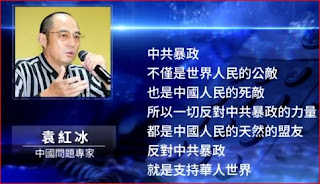Interview : Luo Ya / Editor : Huang Yimei / https://www.ntdtv.com/gb/2020/10/06/a102957549.html / Translation, editing : Gan Yung Chyan, KUCINTA SETIA / Images : Video Screenshots
US Secretary of State Pompeo arrived in Tokyo on 6 October, and held the "Quadruple Security Dialogue" (QUAD) with the foreign ministers of Japan, Australia and India, seeking to adopt a consistent position on the CCP. Outsiders are concerned about whether the talks will also "join together" against the CCP's military expansion in the South China Sea.
Pompeo originally planned to visit Japan, Mongolia and South Korea during his Asian trip. As US President Trump was diagnosed with covid on the 2nd, Pompeo shortened his itinerary and only kept the part of his visit to Japan.
In addition to the four-nation "foreign ministers" meeting, Pompeo also met with Japanese Prime Minister Yoshihide Suga. In the morning of the 6th, Pompeo and Japanese Foreign Minister Toshimitsu Motegi held bilateral talks at the Iikura Mansion of the Japanese Ministry of Foreign Affairs. Motegi Toshimitsu said that the Yoshihide Suga government will adopt past policies to strengthen the alliance between Japan and the United States and stabilize the peace of the international community.
Professor Feng Chongyi of the University of Technology Sydney: "The United States wants to return to Asia. It must rebuild a new one, which is to connect politics, economy and military together. These democratic countries, which belong to China's neighboring democratic countries, must be united to deal with it. The Chinese Communist regime. Now this foreign ministers’ meeting is one of the plans here."
China expert Yuan Hongbing said that the core theme of this four-nation "security dialogue" is how to further strengthen the countermeasures against the CCP's totalitarian global expansion.
China expert Yuan Hongbing: "This is not only an Asian problem, but also an Asian Asia-Pacific region and NATO problem. This is an important factor for the entire international community to form a broad alliance of democratic countries to counter the CCP’s totalitarian global expansion. One step."
Indian Foreign Minister Subrahmanyam Jaishankar tweeted that the four foreign ministers will work together for the freedom, peace and prosperity of the Indo-Pacific region.
The US Deputy Secretary of State Stephen Biegun also earlier proposed that the US formally consider establishing NATO-style alliances with Asia-Pacific countries to jointly fight the Chinese Communist regime.
Japanese media reported that in addition to the four foreign ministers' meeting, under the leadership of the United States, democratic countries such as the United Kingdom, the European Union, Canada and Taiwan may also be assembled in the future. Professor Feng Chongyi of the University of Technology Sydney believes that the ultimate goal of the global anti-communist alliance strategy is to disintegrate the CCP.
Feng Chongyi: "The current strategic goal is still to force internal changes in the CCP regime through this pressure, so that it can disintegrate. The CCP regime can't stand it, and it depends on whether it will cause internal CCP under pressure. Like the first Cold War, the Soviet Union had this reforming force, which turned into an internal reform, and then went to disintegrate the evil communist empire from the inside."
The Ministry of Foreign Affairs of the Communist Party of China criticized the United States for intervening in South China Sea affairs and wooing Japan, India, and Australia to form a "Little Asian NATO". This is an anti-China small circle and a Cold War mentality.
Yuan Hongbing: "Pompeo has made it clear that, in his view, the CCP is not equal to China. Of course, opposing CCP tyranny is not the same as anti-China. These two concepts are completely irrelevant. On the contrary, CCP tyranny is not only It is the public enemy of the people of the world and the mortal enemy of the Chinese people. Therefore, all forces opposed to the tyranny of the CCP are natural allies of the Chinese people. To oppose the tyranny of the CCP is to support the Chinese world. To oppose the tyranny of the CCP is to promote democracy in East Asia. It is a process."
Yuan Hongbing said that the CCP’s tyranny first challenges the freedom, democracy, peace and order of the international community, and the United States is only fighting it.
Yuan Hongbing: "The totalitarian expansion of the CCP threatens morality not only in the interests of the United States, but also in the interests of the entire international community. For example, its current forceful persecution of Taiwan is clearly intended to change the Asia-Pacific region. The political structure is to undermine peace and stability. Then President Trump has led the entire United States, and now the entire international community, has stepped out of the appeasementism that has been appeasement of the CCP’s tyranny for nearly half a century."
Alexander Neill, a former senior researcher of the "Shangri-La Dialogue" forum, pointed out in an interview with Voice of America that the "Quadruple Security Dialogue" has broken away from the hollow development in the past year. The threat of force and rising tensions in the South China Sea have developed a unity of vision of a democratic country. He expected that although Pompeo would only stay in Tokyo for one day, he might use this alliance to highlight the CCP's increasingly "self-isolation" behavior.




No comments:
Post a Comment